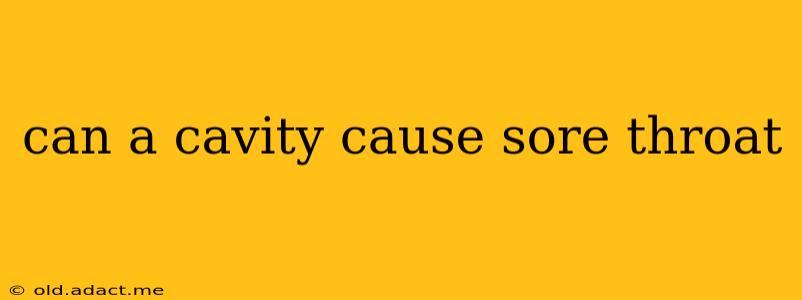Can a Cavity Cause a Sore Throat?
While not directly, a cavity can indirectly contribute to a sore throat. It's not a common cause, but the connection lies in the potential for complications stemming from untreated tooth decay. Let's explore this relationship in detail.
How Cavities Can Indirectly Lead to Sore Throat Symptoms
A cavity itself doesn't cause a sore throat in the way a viral infection or strep throat does. However, severe tooth decay can lead to several issues that can manifest as throat pain or discomfort:
-
Infection Spread: A severely infected cavity can lead to an abscess, a pocket of pus that forms at the root of the tooth. If this abscess grows large enough, it can press against nearby tissues and potentially trigger pain that radiates to the throat or jaw. This pressure and inflammation can mimic a sore throat.
-
Dental Abscesses and Throat Swelling: A dental abscess can also cause swelling in the surrounding tissues, including those in the throat area. This swelling can make swallowing painful and contribute to a feeling of a sore throat.
-
Referred Pain: Pain from a tooth abscess isn't always localized to the tooth itself. It can be referred to other areas, including the jaw, ear, and even the throat, leading to confusion about the source of the pain. This is because the nerves in these areas share connections.
What are the Symptoms of a Tooth Abscess?
To determine if a sore throat is linked to a dental issue, it's crucial to recognize the symptoms of a tooth abscess:
- Severe, throbbing toothache: This is often the most prominent symptom.
- Sensitivity to heat and cold: Your affected tooth may become incredibly sensitive to temperature changes.
- Swelling in the jaw or face: Noticeable swelling in the area around the infected tooth.
- High fever: A sign of a more serious infection.
- Bad breath: A persistent foul odor from your mouth.
- Pus formation: Visible pus around the affected tooth or gum.
How to Differentiate Between Sore Throat from a Cavity and other Causes
A sore throat caused by an infected tooth will often present with the aforementioned dental symptoms alongside throat pain. A simple sore throat from a viral or bacterial infection is usually accompanied by other symptoms like coughing, sneezing, runny nose, and general malaise. If your sore throat is accompanied by severe tooth pain, jaw swelling, or other dental symptoms, see a dentist immediately.
When Should You See a Dentist?
Any persistent toothache or symptoms suggestive of a dental abscess requires prompt professional attention. Early intervention can prevent the spread of infection and minimize discomfort.
Can a Cavity Cause a Sore Throat Without an Abscess?
It's unlikely. Without the progression to an abscess or significant inflammation, a cavity itself rarely causes direct throat pain. Any throat discomfort felt in conjunction with a cavity likely stems from an associated infection or referred pain.
In conclusion, while a cavity doesn't directly cause a sore throat, severe complications arising from untreated cavities, such as abscesses, can indirectly lead to throat pain and discomfort. If you experience sore throat symptoms alongside dental issues, consult a dentist for proper diagnosis and treatment.
